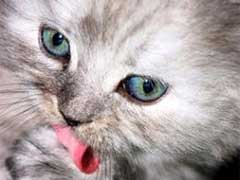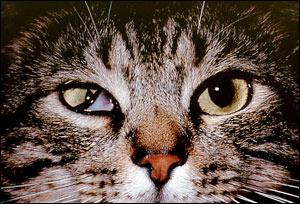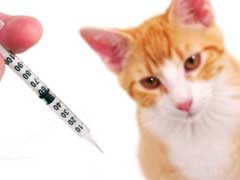What is anemia?
Blood is composed of several different types of cells, the red blood cell (RBC) being the most common. The role of red blood cells is to carry oxygen to the tissues, therefore symptoms of anemia are due to insufficient oxygen in the blood and tissues. Anemia is defined as a reduction below normal of circulating red blood cells.
Anemia is not a disease in itself but a symptom. It may be caused by blood loss, red blood cell destruction (known as hemolysis) or inadequate red blood cell production.
Blood loss and red blood cell destruction are classified as regenerative anemia. In regenerative anemia, the bone marrow is able to produce more red blood cells although this may not occur quickly enough to replace the lost RBC's. Inadequate red blood cell production is classified as non-regenerative anemia. This is where the body is unable to produce more red blood cells in the bone marrow.
What causes anemia in cats?
Regenerative anemia:
-
Hemorrhage (blood loss). This may be obvious such as a laceration, or less obvious such as internal bleeding.
-
Parasites such as worms, fleas or blood parasites (Hemobartonella or Cytauxzoon).
-
Immune-Mediated Hemolytic Anemia (IMHA), is a disease in which the cat's own immune system can become directed against its own red blood cells.
-
Heinz-body hemolytic anemia.
-
Ingestion of certain medications, foods or toxins such as acetaminophen, naphthalene mothballs, propylene glycol, copper, zinc, onion.
-
Neonatal Isoerythrolysis (blood type incompatibility).
Nonregenerative anemia:
-
Feline Leukemia Virus
-
Feline Immunodeficiency Virus
-
Chronic renal failure
-
Some cancers
-
Poor nutrition/starvation
-
Chronic inflammatory disease
What are the signs of anemia in cats?
-
Pale mucous membranes
-
Lethargy
-
Loss of appetite
-
Weight loss
-
Generalised weakness
-
Rapid breathing and pulse (tachypnea)
-
Heart murmur
-
Sleeping more than usual
-
Black, tarry stools
How is the cause diagnosed?
Your veterinarian will perform a complete physical examination of your cat and obtain a medical history from you. Tests he may wish to perform include:
-
Complete blood count. A series of tests which evaluates the cellular components of blood (red blood cells, white blood cells and platelets). Elevated numbers of reticulocytes (immature red blood cells) would point to regenerative anemia. Regenerative anemia are indicative of either blood loss or red blood cell destruction.
-
Blood smear to check for the presence of blood parasites and abnormalities of RBC's.
-
Biochemical profile to evaluate the overall health of the cat and determine if there is any organ involvement.
-
If gastrointestinal blood loss is suspected, a fecal examination.
-
Xray to check for foreign objects, organ size, tumours.
-
Bone marrow biopsy for cats with non regenerative anemia to check for Coombs test. Also known as antiglobulin test or direct antibody test, this test is to detect the presence of antibodies which can bind to the surface of red blood cells.
How is feline anemia treated?
Finding and treating the cause of anemia is the goal. Some treatment options may include:
-
Blood transfusion may be indicated for acutely anemic cats.
-
Erythropoeitine: The kidneys produce a hormone, erythropoietin, which instructs the bone marrow to produce red blood cells. Cats with kidney failure often have a low red blood cell count. Only the human form is available and some cats may eventually recognise this substance as foreign and antibodies will be created against it.
-
Anti-parasitic medication for fleas or worms.
-
Antibiotics oxytetracycline or doxycycline and treatment with a glucocorticoid such as prednisolone may also be prescribed to diminish the immune-mediated component of the disease process if the cat is found to have feline infectious anemia.
-
Surgery and or chemotherapy to treat cancer.
-
Supportive care.
Also read:
Cat symptoms

 Bald Spots on Cats
Bald Spots on Cats Bald spots are a common occurrence in cat
Bald Spots on Cats
Bald Spots on Cats Bald spots are a common occurrence in cat
 Cat Throwing Up – What Can I Do To Help?
Simple
Cat Throwing Up – What Can I Do To Help?
Simple
 Anisocoria in Cats
Anisocoria (unequal pupil sizes) in Cats
Anisocoria in Cats
Anisocoria (unequal pupil sizes) in Cats
 Anaphylaxis in Cats
Anaphylaxis in Cats Also known as allergic shock, anaphylasi
Anaphylaxis in Cats
Anaphylaxis in Cats Also known as allergic shock, anaphylasi
 Top 10 Things to Know About Cat Vaccinations
Cat va
Top 10 Things to Know About Cat Vaccinations
Cat va